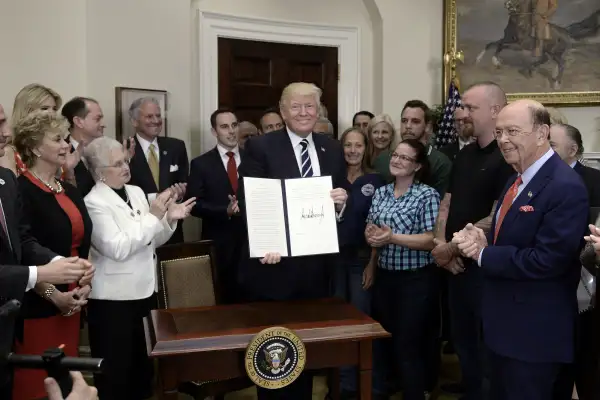4 Things to Know About Trump's $200 Million Apprenticeship Plan

President Donald Trump announced Thursday a plan to make apprenticeships the core of his strategy to fight unemployment.
As part of the administration's “workforce development week," the president's push to train a new generation of workers is geared at matching workers with millions of open jobs and thus, closing the phenomenon known as the “skills gap," the disparity between the skills employers want and those applicants have.
Critics, however, say the announcement doesn’t jive with the deep cuts laid out in his proposed budget, which slashes Labor Department funding by 21% and guts training and employment services aimed at getting unemployed Americans back to work.
As the details begin to roll in, here are four things you should know.
1. What is An Apprenticeship?
Apprentice programs combine on-the-job training with classroom instruction — “earn while you learn” is the phrase Trump has used frequently throughout the last week. Apprenticeships are available across a variety of disciplines, but are most common in the construction, manufacturing, public administration and transportation industries. Today, Trump mentioned expansion into machinery, tech, steel and "roads and bridges."
As of last year, 505,000 people held apprenticeships in the U.S., according to Department of Labor data. About half of the all the active apprentices are in construction, and another 35% are in manufacturing.
These programs enjoy a fair amount of bipartisan support, and have gotten a lot of buzz in recent months: In a March roundtable discussion, Salesforce CEO Marc Benioff called on Trump to create 5 million apprenticeships in the next five years. Trump endorsed the goal.
Such programs are sometimes tapped as alternatives to four-year colleges. Trump's apprenticeship rollout, he said Thursday, will "place students into great jobs without the crippling debt" that often comes with it.
2. What’s Trump’s plan?
Trump’s speech was light on details, but according to the Associated Press, about $200 million will be used for the new program. That nearly doubles the existing level and the funds will be used from the Labor Department.
The driving point, officials say, is to give employers, unions and trade groups more flexibility to design their own apprenticeship programs outside the Labor Department’s ultra-specific guidelines.
“We have regulations on top of regulations,” Trump said Thursday. “We’re empowering companies, unions, industry groups and federal agencies to go out and create new opportunities for millions of citizens.”
3. So How Will This Work With the Trump Budget?
While the executive order is being touted as a strategy to fight unemployment, it follows a proposed budget that axes funding to the Labor Department by 21%, drastically reduces the Workforce Innovation and Opportunity Act, and slashes grants aimed at getting unemployed Americans back to work.
On Thursday, Trump also touted the importance of getting more women into apprenticeships, but the White House budget eliminates a $1 million women in apprenticeship grants. “The goals of this program will be met with the broader Apprenticeship program,” the budget notes.
The proposed budget also drastically reduces funding to the Women’s Bureau, the only federal agency responsible for with advocating for working women.
When the president and his daughter Ivanka Trump toured a Wisconsin technical college to promote the plan earlier in the week, Wisconsin Senator Tammy Baldwin said the message from the White House “doesn’t match the reality of the budget cuts they are proposing.”
4. Wait, Didn't Obama Have an Apprenticeship Program?
Apprenticeships were a priority for the Obama Administration and in 2015, Obama awarded $175 million in apprenticeship grants — the first-ever programmatic funding for registered apprenticeships in the U.S.
In 2016, nearly $90 million in grants were appropriated for apprenticeship expansion.
On Twitter Thursday, Chris Lu, Former Deputy Labor Secretary under Obama, said Trump’s executive order “is simply a funding shift from other training programs.”
